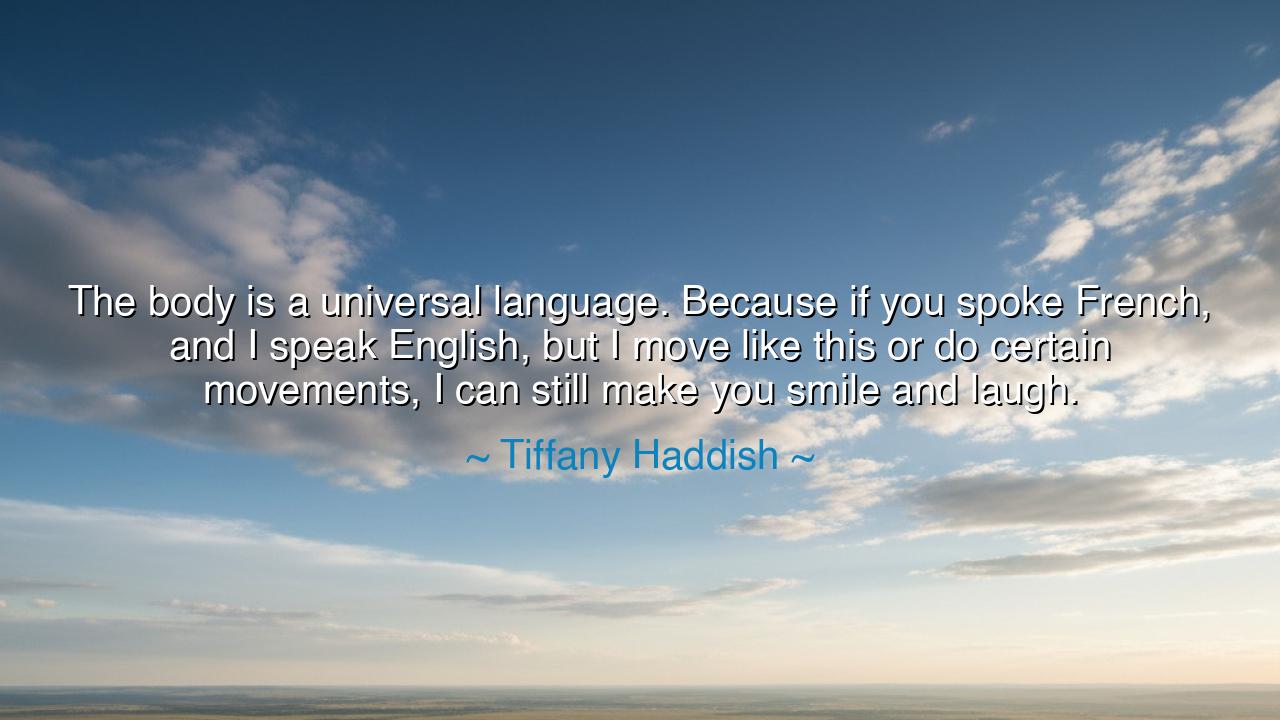
The body is a universal language. Because if you spoke French
The body is a universal language. Because if you spoke French, and I speak English, but I move like this or do certain movements, I can still make you smile and laugh.






The voice of Tiffany Haddish carries to us a truth that the ancients themselves would have honored: “The body is a universal language. For if you spoke French, and I speak English, yet I move like this or make certain movements, I can still make you smile and laugh.” Though her words are clothed in the humor of the stage, they carry the weight of something eternal. For beyond the barriers of nations, beyond the boundaries of tongues, there is an unspoken speech written into our very flesh—the movements of hand, the raising of brow, the rhythm of laughter—that bind human beings together across all divisions.
To say the body is a universal language is to recognize that long before words were carved into clay or inked upon scrolls, men and women spoke with gestures, with dance, with expressions that could pierce the heart more swiftly than syllables. The infant, born without speech, reaches forth with trembling arms to be held; the mother, without utterance, soothes with her smile. These things are known in every land, under every sky, for they are not learned but given, not taught but woven into our very creation.
History itself offers us countless testimonies. Think of the great Charlie Chaplin, whose silent films traversed the world at a time when languages divided nations. With no voice but his body, he stirred laughter in the weary, tears in the broken, and hope in the oppressed. In the days of hardship, when bread was scarce and fear was plentiful, Chaplin’s movements—his stumble, his tilt of the hat, his wide-eyed glance—spoke to the hearts of millions. No translation was needed; the body itself proclaimed joy to every soul.
Yet this truth is not only for artists and jesters, but for all who dwell upon the earth. When a traveler enters a foreign land, and words cannot be understood, a nod, a smile, a gesture of kindness builds a bridge stronger than stone. When enemies face each other across the battlefield, a hand extended to offer water speaks louder than treaties. When lovers, divided by culture or tongue, share a glance, the heart understands what the mind cannot phrase. The body, in its simplicity, unites where intellect divides.
The lesson, therefore, is clear: do not neglect this ancient speech. Let your movements be a blessing. Walk with openness rather than with pride. Extend your hands in generosity. Allow your smile to be a weapon against despair, your laughter to be a balm against sorrow. For these things require no dictionary, no translation—they are understood by kings and beggars, by children and elders, by all who carry the breath of life within them.
Practical wisdom flows from this truth: when you enter a place of strangers, do not hide your face in fear—let it shine with kindness. When you cannot find the right words to comfort, offer a gentle touch, a presence that speaks silently yet powerfully. When you long to connect, but the chasm of language yawns wide, remember that the body itself is your bridge.
The ancients would say: “Where tongues fail, the eyes and hands still speak.” So let your eyes be clear, your hands be open, your posture be one of welcome. Do not underestimate the power of a bowed head in respect, or an embrace in compassion, or a playful movement that brings forth laughter. These things are immortal in their effect.
Thus, from the lips of Tiffany Haddish, though spoken in jest, comes a teaching of profound significance: the body is a universal language, and when wielded with wisdom, it is capable of binding humanity together. Let us then use this gift not for harm, but for healing; not for division, but for union. In every land, in every age, let us move, let us smile, let us laugh—and in so doing, let us speak the oldest and most beautiful language of all.






AAdministratorAdministrator
Welcome, honored guests. Please leave a comment, we will respond soon